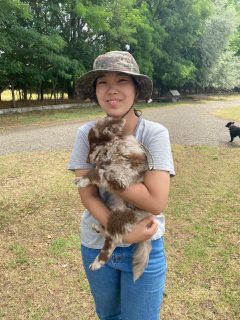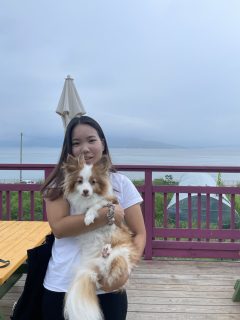Life is a series of decisions we make, and depending on our choice, we will live with the consequences. At the end of high school, some students will have definite ideas about their future career, while many others will have no idea at all. A load of this big decision can be overwhelming. Taking a gap year (or more) can give you the time to think about what your passion in life really is. Travelling around the world, volunteering, making new friends can serve you well during your time at university and also make it easier to obtain a career after graduation. At the end of high school Yuri Oh made a decision which was not usual at that time. Let’s see how it turned out!
I came from Seoul, South Korea, I am 25 years old and starting my 3rd year at the university. Growing up in Seoul, which is an urbanized area, I did have less experience with pets. Although the number of people who keep pets as companion animals is increasing nowadays. I always dreamed about having a job that I love and I can practice regardless of the place. After finishing high school, I took 3-4 gap years to find what I want to devote myself to. It is veterinary medicine. As a vet, you have a lot of opportunities: you can treat animals as a clinical veterinarian, be a researcher or a professor.
 How often do people take gap years as you did? Is it common in Korea?
How often do people take gap years as you did? Is it common in Korea?
Well, it depends on the person. In the European culture, it is common thing that you take a year to gain some experience on your own and travel the world. When I took a couple of years, it was less common, so my family and friends did not like it. I needed to explain my thoughts and plans to everyone. Honestly, I did not expect it to be this long. However, I don’t regret it, I learned a lot. It was a good opportunity to think about my life and the future.
Which countries did you visit?
I had been to many countries like Taiwan, Vietnam, Malaysia, Singapore, Philippines, China…etc. My favourite destination was Japan. I’ve been there 9 times, from Korea it is close and not too expensive. I am crazy about travelling. This year I have been to Austria, Italy, France, Greece and I am thinking about travelling to more European countries.
What about your parents? How did they react to your plan to study in Hungary?
Although none of my parents have anything to do with medicine, they were very supportive. Studying abroad was my long-term goal and they were happy that I got the Stipendium Hungaricum scholarship and got accepted to UVMB. I found the scholarship while I was searching for European vet schools where I can study in English.
It is known that the standard of Korean education is really high. How do you see this?
It is very competitive and students are working hard. In Korea, they spend 6 years in elementary school, 3 years in middle school and 3 years in high school. After that, they can choose to go to university or go to work. From what I’ve heard, more than 70% of the students choose to continue studying at universities. So I can say they are enthusiastic about studying.
 You mentioned that more and more people keep animals in Korea, mainly dogs. I was surprised to hear that some breeds are banned from public parks. Why is that?
You mentioned that more and more people keep animals in Korea, mainly dogs. I was surprised to hear that some breeds are banned from public parks. Why is that?
Unfortunately, you can hear about dog attacks quite frequently. There is an animal safety law about the potentially dangerous 5 dog breeds, Tosa inu(dog), American pit bull terrier, American staffordshire terrier, Staffordshire bull terrier and Rottweiler, to protect people. These 5 breeds – next to leash – must wear muzzles from when they are 3 months old. They are not allowed to enter some places such as kindergartens, schools and parks (depending on bylaws) for safety measures.
Some people take off the leash anyways which can lead to serious dog accidents. I think educating the owners about their pets’ behaviour is essential. When I got here to Budapest, I was surprised that there are many well-trained dogs. I haven’t seen or heard of dog accidents in Hungary yet. I hope the infrastructure of dog training in Korea develops and can lead to a reduction in accidents in the future.
All of the breeds you mentioned have quite large bodies. Do people feel intimidated by these dogs because of their size?
Yes, some people think that big dogs are dangerous. I used to work as a pet sitter before I came here. I took care of 3 border collies, which were very friendly and loved people. Once I was hiking with these dogs and I sat down on a bench at the very corner. Then suddenly people came to me and asked us to leave for another place because they were afraid of the dogs. It made me sad and the dogs felt the same way.
In Hungary, there are a lot of places which offer dog training courses. Do you have something similar?
Yes, we do, but only a few and they are very expensive. If your dog shows problematic behaviour and you want to fix it, it costs you a lot of money. I think it is better to gain knowledge about animals beforehand than try to fix their problematic behaviour. Also, we need to educate both the owners and the animals by establishing more affordable dog schools.
Talking about dogs, there is global pressure to stop eating dog meat. I am not sure if it is banned in South Korea, I read that there were law changes on this topic.
Oh yeah, it is a sensitive topic even in Korea. Eating dog meat has not been banned yet. There is a decrease in the number of people who eat dog meat nowadays, however, you can find dog soup restaurants easily. Still, the older generation wants to have soup during the summertime, as far as I know, it has historical roots. Rice is a major ingredient for Korean people, it was very difficult to have meat on the table. Since cows and pigs were important sources for farming, it was difficult to find good protein sources. People chose to have dog meat because it was relatively easier to get than beef. So back then it was an inevitable source of survival.
As I’m against the consumption of dog meat, recently I joined a protest. Walked to the parliament with huge signs “Stop eating dog meat!”. I wish that in the future people stop eating dog meat.
You are starting your 3rd year, so it might be a bit early to ask about your future plans. Is there any special area you would like to focus on?
I am interested in ruminants and small animals, but they say I should wait until 4th grade to get more experience. I would like to use my summer practices to gain more experience in different species of animals. I am not sure that I will go back to Korea after I graduate. Of course, I would love to go back to my family, but my country is so competitive and I am tired of competing all the time. I would like to work and join specialist courses in the U.S.
Competition is something that you mentioned several times during our talk. Is it a serious issue in South Korea?
Studying is different back home. Here if you pass an exam with 90% you get a 5 and you do not have to compete with your classmates. Everyone can get a 5 if they perform over 90%. However, the grading system is based on a relative evaluation in Korea. There are 9 different grades (1 ~ 9) in high school. For example, if you get in the highest 4% score of all your classmates, you will get grade 1, which is the highest mark you can get. You get a 2 if you get a result in the top 4-11%, you get a 3 if you get a result in the top 11-23% and so on. I went to a high school with small classes where only 2~3 people (4%) could get the top mark. It was mentally exhausting because you never knew how much studying was enough to get the mark you wanted. In my high school, we usually studied till 10 PM and we felt it was not enough. Maybe this system is the reason why academic stress affects students too much.
You mentioned anatomy was your favourite subject, do you have a favourite teacher?
Professor Ferenc Szalay, my anatomy teacher, is my favourite. He encourages students to learn more and more. Anatomy is an important and tough subject, while I studied I usually made a long list of questions and then visited him every week. I remember that last semester we had a 4-hour long lecture and we finished around 7 PM. I could see that he was very exhausted (I was too) but he stayed for an additional hour so we could go through all of my questions. His knowledge is amazing. He made the lectures very enjoyable. I would like to thank him for all of his efforts.
Now if you have some free time, what do you do?
Since Budapest is a popular destination, lots of Koreans study here, but I have friends from other countries as well. I like to spend time with them, invite each other over and cook something (I love gulyás soup, I even tried to make it and it turned out good). Now that COVID is not that serious we can have lots of student activities at the uni, I had the chance to go to EQUUS parties this year. Hope I can join more events next semester.
Alexandra Bulejka
